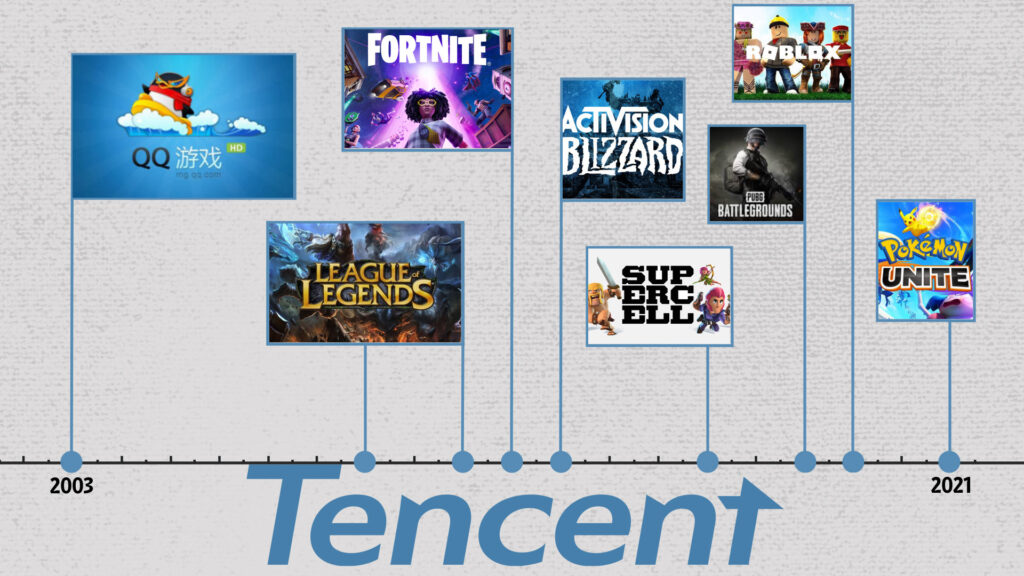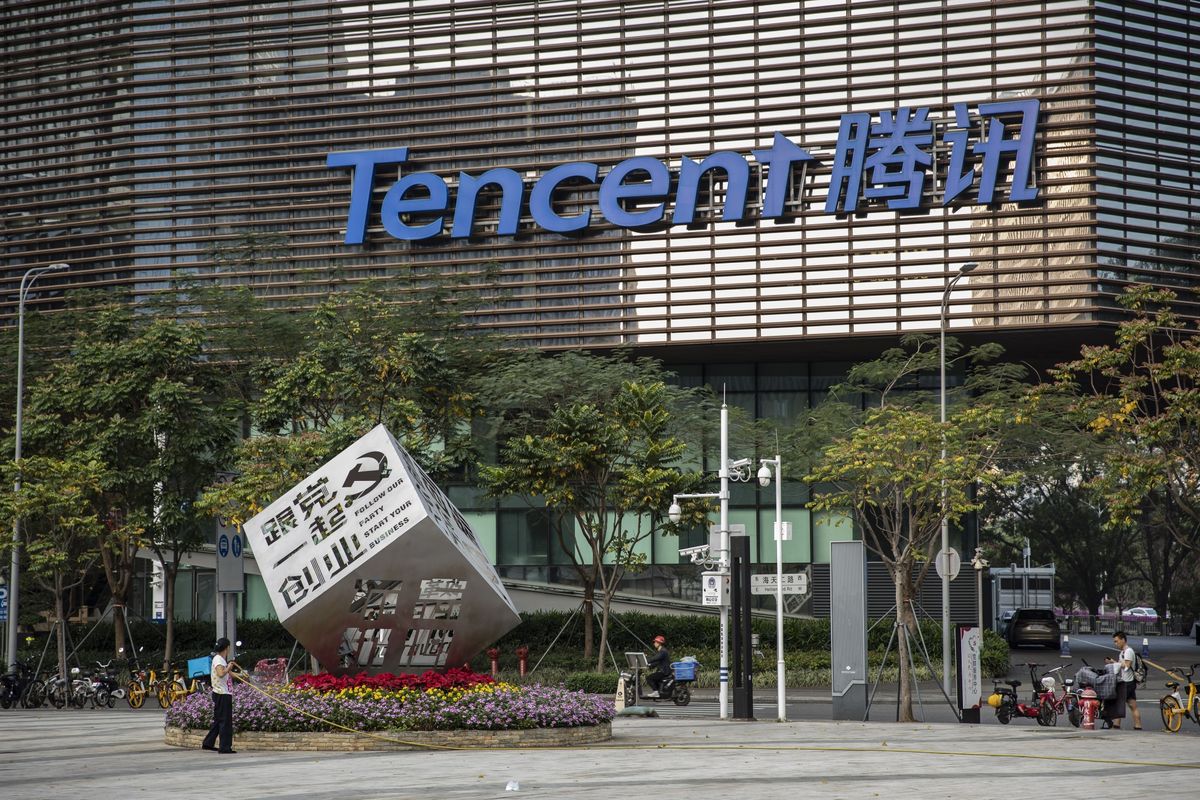Tencent is a Chinese multinational conglomerate that operates primarily in the technology and entertainment industries. It was founded in November 1998 and is headquartered in Shenzhen, China.
Tencent’s core business is in social media and gaming, but it has also expanded into various other areas, including music, e-commerce, advertising, fintech, and artificial intelligence. Its flagship social media platform is WeChat, which has over 1.2 billion monthly active users and is widely used for messaging, social networking, mobile payments, and other services. Tencent also owns QQ, another popular messaging app with over 600 million monthly active users.
In the gaming industry, Tencent is one of the world’s largest video game companies, with a portfolio of games that includes titles such as League of Legends, Honor of Kings, and PUBG Mobile. Tencent is also a major investor in other gaming companies, including Riot Games, Epic Games, and Activision Blizzard.
In addition to its core businesses, Tencent has also expanded into other areas. It has invested in a number of e-commerce companies, including JD.com and Pinduoduo, and owns a stake in online music streaming service Tencent Music. Tencent has also launched its own mobile payment service, WeChat Pay, which competes with Alibaba’s Alipay in China’s rapidly growing mobile payments market.
Overall, Tencent has become one of the most valuable companies in the world, with a market capitalization of over $400 billion as of 2023. It has a significant influence on China’s technology and entertainment industries, as well as the global gaming industry.
History of Tencent – Major milestones across its glorious history
Tencent was founded by Ma Huateng (also known as Pony Ma) and four of his friends in November 1998. The company’s name, “Tencent,” is derived from the Chinese phrase “teng xun,” which means “galloping fast information.” In the early years of its history, Tencent focused on developing its instant messaging software, QQ, which became one of the most popular messaging apps in China.
Here is a more detailed history of Tencent, from its founding to the present day:
1998: Tencent is founded by Ma Huateng (also known as Pony Ma) and four of his friends in Shenzhen, China. The company’s first product is a messaging platform called OICQ, which is later renamed QQ.
1999: Tencent launches QQ, its first instant messaging software. The software quickly becomes popular in China, and by 2002, it has over 100 million users.
2000: Tencent receives $2.2 million in funding from IDG Capital Partners and becomes a limited liability company.
2001: Tencent launches Tencent Traveler, its web browser.
2002: Tencent launches QQ Game, its online gaming platform. The platform includes games such as Dungeon & Fighter and QQ Speed, which become hugely popular in China.
2004: Tencent goes public on the Hong Kong Stock Exchange, raising $192 million in its initial public offering.
2005: Tencent launches QQ Music, its online music platform. The platform offers streaming music and music downloads.
2006: Tencent launches Qzone, its social networking platform. Qzone allows users to create their own blogs, share photos, and connect with friends.
2007: Tencent acquires a 15% stake in China’s second-largest search engine, Soso. The investment helps Tencent to expand its presence in the search market and compete more effectively with Baidu, China’s dominant search engine.
2008: Tencent launches Tencent Weibo, its microblogging platform. Tencent Weibo allows users to post short messages and share photos and links.
2010: Tencent launches WeChat, a mobile messaging app that includes features such as voice messaging and social networking. WeChat quickly becomes popular in China and begins to challenge the dominance of QQ.
2011: Tencent acquires a 49% stake in Riot Games, the developer of League of Legends, for $230 million. League of Legends becomes one of the most popular video games in the world, and Tencent’s investment in Riot Games helps to cement its position as a major player in the gaming industry.
2012: Tencent acquires a 36.5% stake in Sogou, a Chinese search engine. The investment helps Tencent to expand its presence in the search market and compete more effectively with Baidu.
2013: Tencent launches Tencent Video, its online video platform. The platform offers streaming movies, TV shows, and other video content.
2014: Tencent launches WeChat Pay, its mobile payment service. WeChat Pay quickly gains traction in China and becomes a major competitor to Alibaba’s Alipay in the mobile payments market.
2015: Tencent acquires a 84.3% stake in Supercell, the Finnish developer of mobile games such as Clash of Clans and Clash Royale, for $8.6 billion. The acquisition is one of the largest in the gaming industry and helps to expand Tencent’s global footprint.
2016: Tencent launches Tencent Cloud, its cloud computing platform. The platform offers services such as cloud storage, computing, and database management.
2018: Tencent becomes the first Asian company to reach a market capitalization of $500 billion. However, the company’s stock price begins to decline later in the year as a result of increased regulation of the gaming industry in China.
2019: Tencent launches a cloud gaming service called Tencent Instant Play. The service allows users to play high-quality video games on their mobile devices without having to download or install them.
2020: Tencent invests in a number of companies, including Universal Music Group, Warner Music Group, and Roblox Corporation. The company also partners with a number of companies, including Huawei and Pokémon Go developer Niantic, to expand its reach in the technology and gaming industries.
2021: Tencent continues to expand its presence in the gaming industry, with acquisitions of studios such as Klei Entertainment and Sumo Digital. The company also faces increased scrutiny from Chinese regulators over its market dominance and data practices.
Overall, Tencent has had a remarkable history of growth and innovation since its founding in 1998. From its early days as a messaging platform to its current status as a major player in gaming, social networking, and cloud computing, Tencent has continually evolved to meet the changing needs of consumers and businesses in China and around the world. With its massive user base and deep pockets, Tencent is likely to continue to be a force to be reckoned with in the technology industry for years to come.
Tencent Companies and Investments across the industries
Tencent is a large and diversified company with a presence in many different sectors. Here are some of the top segments of Tencent:
Gaming: Gaming is one of Tencent’s core businesses and the largest revenue generator for the company. Tencent has invested heavily in both PC and mobile gaming and has a diverse portfolio of games. Its games include popular titles like Honor of Kings, PUBG Mobile, and Call of Duty Mobile. Tencent also owns stakes in a number of game developers around the world, including Riot Games, Epic Games, and Activision Blizzard.

Social networking: Tencent’s social networking products include QQ, WeChat, and Qzone. WeChat, which has over 1 billion monthly active users, is one of the most popular social networking apps in China. It allows users to chat, make video and voice calls, share photos and videos, and connect with friends and family. QQ, which is also popular in China, is a messaging platform that allows users to send messages, play games, and share photos and videos. Qzone is a social networking platform that allows users to create blogs, share photos, and connect with friends.
Digital content: Tencent’s digital content segment includes platforms for streaming movies and TV shows, music streaming and downloads, and e-books. Tencent Video, which has over 120 million subscribers, offers licensed and original content. QQ Music, which has over 800 million monthly active users, offers music streaming and downloads. Tencent Literature is an e-book platform that offers over 7 million books.
Payment services: Tencent’s payment services include WeChat Pay and QQ Wallet. WeChat Pay is a mobile payment platform that allows users to pay for goods and services using their mobile devices. QQ Wallet is a similar platform that is integrated with QQ.
Cloud computing: Tencent’s cloud computing platform, Tencent Cloud, offers a range of services, including cloud storage, computing, and database management. It has a number of clients in industries such as gaming, e-commerce, and finance.
Online advertising: Tencent’s online advertising business is primarily focused on its various platforms, including WeChat, QQ, and Tencent Video. The company also operates the Tencent Ad Platform, which allows businesses to advertise on its platforms.
Artificial intelligence: Tencent has invested heavily in artificial intelligence and has a number of products and services in this area. This includes facial recognition technology, voice assistants, and machine learning. Tencent is also involved in research and development of autonomous driving technology.
Overall, Tencent’s diverse portfolio has helped it to become one of the largest and most valuable companies in the world. Its focus on gaming, social networking, digital content, payment services, cloud computing, online advertising, and artificial intelligence has allowed it to be a major player in many different industries.
But actually how big is Tencent? – Revenue Streams of Tencent
Tencent is one of the largest and most valuable companies in the world. Here are some details on just how big Tencent is:
Market capitalization: As of April 30, 2023, Tencent had a market capitalization of over $420 billion USD. This makes it one of the most valuable companies in the world, behind only Apple, Microsoft, and Alphabet.
Revenue: In 2021, Tencent generated over $85 billion USD in revenue. This is an increase of over 20% from the previous year.
Profit: In 2021, Tencent had a net profit of over $25 billion USD. This is an increase of over 23% from the previous year.
Employees: As of 2021, Tencent had over 100,000 employees worldwide.
Gaming: Tencent is the largest gaming company in the world, with a portfolio of games that includes both PC and mobile games. Its most popular games include Honor of Kings, PUBG Mobile, and Call of Duty Mobile. In 2021, Tencent’s gaming segment generated over $29 billion USD in revenue.
Social networking: Tencent’s social networking products include QQ, WeChat, and Qzone. WeChat, which has over 1 billion monthly active users, is one of the most popular social networking apps in China. In 2021, Tencent’s social networking segment generated over $20 billion USD in revenue.
Digital content: Tencent’s digital content segment includes platforms for streaming movies and TV shows, music streaming and downloads, and e-books. In 2021, this segment generated over $10 billion USD in revenue.
Payment services: Tencent’s payment services, which include WeChat Pay and QQ Wallet, have over 1 billion users combined. In 2021, Tencent’s payment services segment generated over $9 billion USD in revenue.
Overall, Tencent’s size and revenue are comparable to those of the largest tech companies in the world. Its diversified portfolio and large user base have helped it to become a major player in many different industries, including gaming, social networking, digital content, payment services, cloud computing, online advertising, and artificial intelligence.
Marketing Strategies of Tencent
Tencent uses a variety of marketing strategies to promote its products and services. Here are some of the key marketing strategies that Tencent employs:
Social media marketing: As a company that operates in the social networking and digital content space, Tencent heavily utilizes social media platforms like WeChat and QQ to promote its products and services. Tencent often leverages the reach of these platforms to create buzz around new releases and engage with its user base.
Influencer marketing: Tencent also uses influencer marketing to promote its products and services. The company works with social media influencers and content creators to showcase its products and services to their followers. Influencers often use their platforms to showcase their gaming experiences, promote new releases, and provide tips and tricks for using Tencent’s products.
Sponsorships and partnerships: Tencent also partners with other companies and sponsors events to increase its brand visibility. For example, Tencent has partnered with major sports leagues, including the NBA and NFL, to promote its products to a wider audience. Tencent has also sponsored major events, such as music festivals and gaming conventions.
Advertising: Tencent utilizes advertising across its various platforms to promote its products and services. For example, the company uses targeted advertising to showcase new games or promotions to specific user segments. Tencent also works with businesses to help them advertise on its platforms through the Tencent Ad Platform.
Product placement: Tencent has also used product placement in movies and TV shows to promote its products. For example, Tencent’s Honor of Kings was featured in the Chinese movie “The Wandering Earth,” which helped to increase the game’s popularity.
User-generated content: Tencent encourages user-generated content (UGC) to promote its products and services. For example, Tencentruns contests and promotions that encourage users to create their own content featuring Tencent’s products. This UGC can help to increase brand awareness and create a sense of community around Tencent’s products.
Overall, Tencent’s marketing strategies are varied and adaptable to the specific product or service it is promoting. By utilizing social media, influencers, sponsorships, advertising, product placement, and UGC, Tencent is able to reach a broad audience and promote its products effectively.
Also Read: Electronic Arts (EA Sports) – Nurturing the Digital Artists since 1982
Growth of Tencent over the years
Tencent has experienced tremendous growth over the years, driven by its successful expansion into new markets and its ability to adapt to changing consumer preferences. Here is a closer look at the growth of Tencent over the years:
Early years (1998-2004): Tencent was founded in 1998 by Pony Ma, Zhang Zhidong, Xu Chenye, Chen Yidan, and Zeng Liqing. In its early years, the company focused on developing an instant messaging platform called QQ, which quickly became popular in China. By 2004, QQ had over 100 million registered users.
Expansion into gaming (2005-2010): In 2005, Tencent launched its first online game, QQ Fantasy. This marked the beginning of the company’s expansion into the gaming market. Over the next several years, Tencent acquired several game development studios and launched a number of successful games, including Dungeon & Fighter, League of Legends, and CrossFire. By 2010, Tencent had become the largest online gaming company in China.
Diversification (2011-2015): In the early 2010s, Tencent began to diversify its business beyond gaming. The company launched its social networking platform, WeChat, in 2011, which quickly became one of the most popular social networking apps in China. Tencent also invested in a number of other businesses, including e-commerce, digital payments, and online advertising.
Global expansion (2016-2019): In the mid-2010s, Tencent began to expand its business globally. The company invested in several international companies, including Snapchat, Epic Games, and Spotify. Tencent also launched its gaming platform, WeGame, in several countries outside of China. By 2019, Tencent’s international revenues had surpassed its domestic revenues.
Continued growth (2020-present): Despite the COVID-19 pandemic, Tencent continued to experience strong growth in 2020 and beyond. The company’s gaming segment saw increased engagement as more people turned to gaming during lockdowns. Tencent also continued to invest in new businesses, including cloud computing and artificial intelligence.
Overall, Tencent’s growth over the years has been driven by its ability to identify and capitalize on new opportunities. The company has expanded from its origins as an instant messaging platform to become a major player in gaming, social networking, e-commerce, digital payments, and other industries. Its continued growth and diversification suggest that Tencent will remain a key player in the tech industry for years to come.
Tencent under Chinese scrutiny
Tencent, like many other Chinese tech companies, has been under increased scrutiny from the Chinese government in recent years. There are several reasons why the government is scrutinizing Tencent:
Data privacy concerns: Tencent, like many other tech companies, collects a vast amount of user data. The Chinese government is concerned about the potential misuse of this data, particularly by foreign governments. In response, the government has introduced new data privacy regulations that require companies to obtain explicit user consent before collecting or using their data.
Monopoly concerns: Tencent is one of the largest tech companies in China, and its dominance in certain markets has raised concerns about anti-competitive practices. In 2016, Tencent was fined by Chinese regulators for its exclusive licensing agreements with music labels. More recently, the government has taken steps to curb the power of tech giants like Tencent by introducing new antitrust regulations.
Content regulation: Tencent operates a number of social media and gaming platforms that are used by millions of people in China. The government is concerned about the potential for harmful content, such as fake news or online harassment, to spread on these platforms. In response, the government has introduced new regulations that require companies like Tencent to monitor and censor content more closely.
National security concerns: As a Chinese company, Tencent is subject to Chinese laws that require companies to cooperate with the government on matters of national security. This has raised concerns among foreign governments that Tencent could be used by the Chinese government to gather intelligence or engage in cyberattacks.
Overall, Tencent’s increased scrutiny from the Chinese government is part of a broader crackdown on the tech industry in China. The government is seeking to strike a balance between promoting innovation and protecting consumer rights, while also asserting greater control over the tech industry. While this increased scrutiny may create challenges for Tencent in the short term, the company’s strong position in the Chinese market suggests that it will continue to play a key role in the tech industry for years to come.
To read more content like this, subscribe to our newsletter




